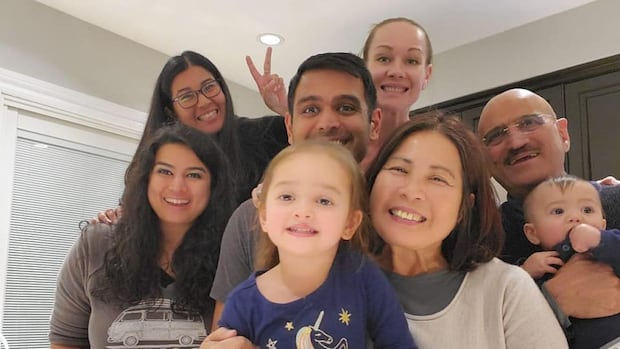“It’s going to take about seven or eight years.”
I gripped the phone handset tighter as I listened to my local MP’s staff member explain the immigration process. She sounded apologetic.
After applying to sponsor my parents and sister to immigrate to Canada from Kuwait in early 2009, I hadn’t heard anything in many months.
Anyone who has ever had to deal with Canadian immigration matters knows the federal government’s website is rarely accurate about wait times.
A friend told me if I contacted my constituency office, it could look into it on my behalf and I’d get an answer faster. A few days later, I received the call.
“There’s a huge backlog … so many want to reunite with their family,” my MP’s staff member continued. I thanked her and hung up.
I felt dejected.
This news about the wait time meant I needed to stay employed to meet the financial requirement for the sponsorship. I’d already gone through two layoffs in the previous 18 months, as this was around the time of the 2008 financial crisis.
I felt chained. I had to remain employed because a denial at any point in the process would mean I might have to start all over again, which would set the timeline back even further. Other plans — like wanting to work abroad for a year — were also quashed.
But it was a no-brainer. My family was the priority.
My parents and sister eventually moved here as permanent residents in October 2016. The woman was right: it took 7½ years.

It’s also why immigration is top of my mind in this upcoming federal election.
Citizenship has always been a forefront issue in my Kuwaiti Filipino family because we come from places where both citizenship and civil rights can be taken away in an instant.
When I moved to Canada, it felt like a breath of fresh air. I would tell my new friends that back home some people couldn’t even get a certificate of vaccination for their children because of their civil status or had to jump through ridiculous hoops just to get a driver’s licence. Their reaction was disbelief. I took it as a sign that we, as a society here in Canada, would never let that happen.
But I was wrong. When Prime Minister Stephen Harper introduced a bill in 2015 that sought to separate natural-born Canadians and naturalized Canadians, I was shocked. I believed and, as other civil rights groups argued, it would have made the latter into second-class Canadians. It was a reminder that even in Canada, civil rights are never guaranteed. Luckily for me, the Conservatives were voted out that year.
Justin Trudeau’s “sunny ways” gave me some relief. My parents see him as pro-immigrant, which was a part of his campaign platform when he ran during the 2015 federal election.
But now, I feel the tides shifting again.
Recent news of Immigration, Refugees and Citizenship Canada pausing applications for sponsoring parents and grandparents didn’t come as a surprise.
I understand Canada’s labour market has certain needs and increasing spots for those immigrants logically makes sense, which takes away from family reunification allocations. But from a personal perspective, I can say having my parents here in Canada helped me immensely.
When I had to deal with a life-changing medical diagnosis, they supported me. Without them, I wouldn’t be in a position to pursue opportunities that, in the long run, elevated me to a higher income bracket. They’ve provided value to me in ways that can’t be quantified. In other words, family reunification can help citizens who are already in the country and make them more effective contributors to society.
With my experience in Canada’s immigration system and the current anti-immigrant sentiment in the United States, I am paying close attention to how these issues are affecting our country.
For example, there’s the issue of rising hate crimes in Canada. There are official statistics, but it’s an open secret that people from marginalized groups don’t report incidents when they are victims. Will resources be allocated to these challenges? Will there be more support for battling hate crimes towards marginalized communities?
I’m also looking at the housing platforms for all the political parties and how they plan to address it for newcomers.
Newcomers say they’re struggling to find stable, affordable housing in Canada, with some experts pointing to construction lagging behind the surge in demand as one aspect of a nuanced issue.
If we want to set them up for success, their basic needs (like housing and finding jobs), have to be accessible.
I don’t know if my voting choice can ever be about promises of improving the health-care system or job opportunities a newly elected government can create. Someday maybe.
Consequently, I’m uneasy about voting for a Conservative government that could easily go rogue and find new ways to alter citizenship laws. Conservative Leader Pierre Poilievre has tied the need to reduce immigration because of a lack of housing for these immigrants, but his mimicry of U.S. President Donald Trump’s views in his communication style and attacks on the media is unsettling.
Some people might call me paranoid, but these thoughts are alive and real in my head. For now, voting Liberal or NDP is a survival strategy for me — to signal I deserve to be here.
What’s the one issue that matters the most to you in this federal election? CBC News will publish a range of perspectives from voters who share the personal experience shaping their choice at the ballot box. Read more First Person columns related to the election here.
Do you have a compelling personal story that can bring understanding or help others? We want to hear from you. Here’s more info on how to pitch to us.

